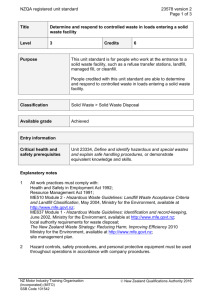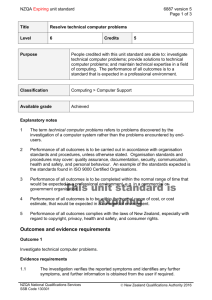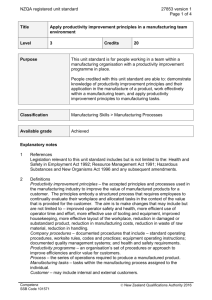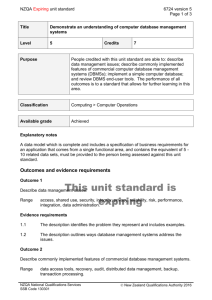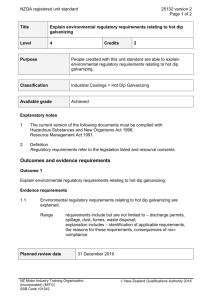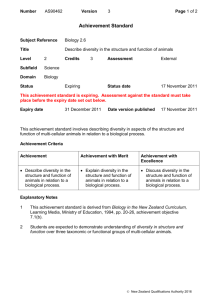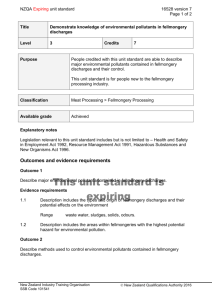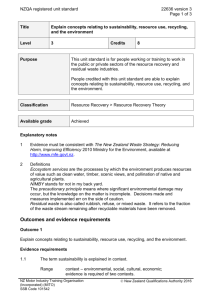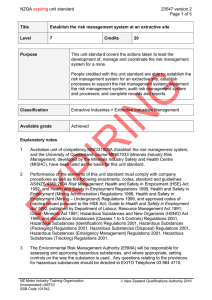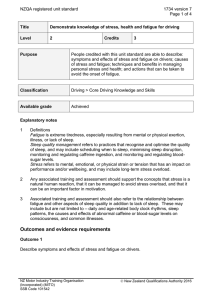22637 Demonstrate knowledge of hygiene and health for
advertisement
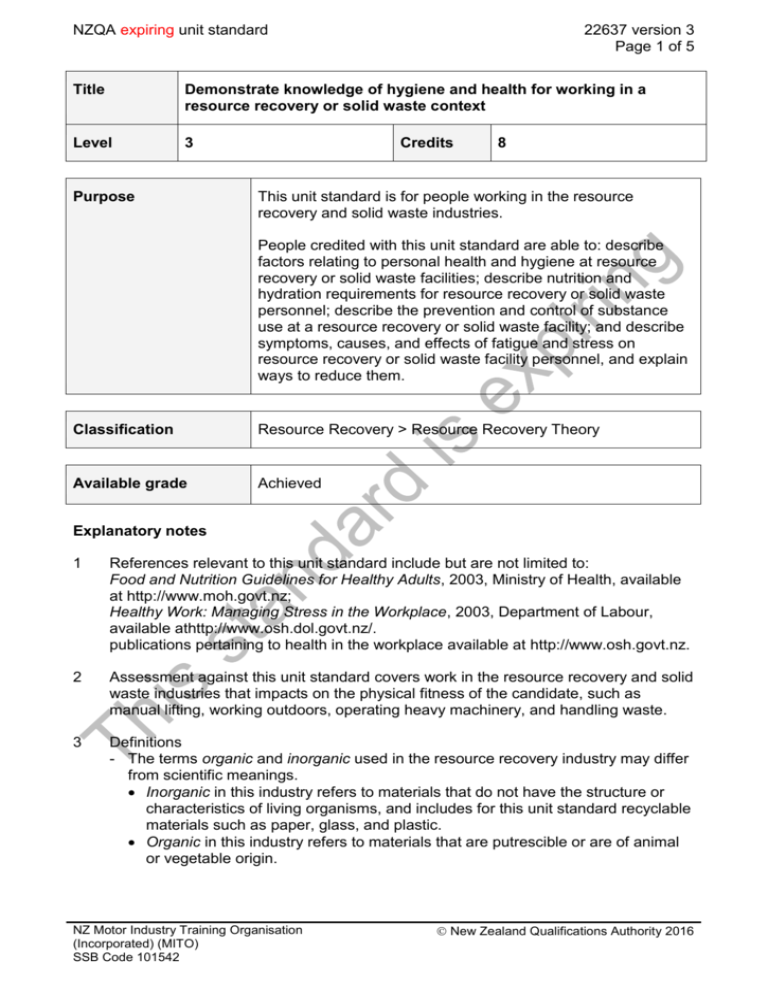
NZQA expiring unit standard 22637 version 3 Page 1 of 5 Title Demonstrate knowledge of hygiene and health for working in a resource recovery or solid waste context Level 3 Purpose Credits 8 This unit standard is for people working in the resource recovery and solid waste industries. People credited with this unit standard are able to: describe factors relating to personal health and hygiene at resource recovery or solid waste facilities; describe nutrition and hydration requirements for resource recovery or solid waste personnel; describe the prevention and control of substance use at a resource recovery or solid waste facility; and describe symptoms, causes, and effects of fatigue and stress on resource recovery or solid waste facility personnel, and explain ways to reduce them. Classification Resource Recovery > Resource Recovery Theory Available grade Achieved Explanatory notes 1 References relevant to this unit standard include but are not limited to: Food and Nutrition Guidelines for Healthy Adults, 2003, Ministry of Health, available at http://www.moh.govt.nz; Healthy Work: Managing Stress in the Workplace, 2003, Department of Labour, available athttp://www.osh.dol.govt.nz/. publications pertaining to health in the workplace available at http://www.osh.govt.nz. 2 Assessment against this unit standard covers work in the resource recovery and solid waste industries that impacts on the physical fitness of the candidate, such as manual lifting, working outdoors, operating heavy machinery, and handling waste. 3 Definitions - The terms organic and inorganic used in the resource recovery industry may differ from scientific meanings. Inorganic in this industry refers to materials that do not have the structure or characteristics of living organisms, and includes for this unit standard recyclable materials such as paper, glass, and plastic. Organic in this industry refers to materials that are putrescible or are of animal or vegetable origin. NZ Motor Industry Training Organisation (Incorporated) (MITO) SSB Code 101542 New Zealand Qualifications Authority 2016 NZQA expiring unit standard 22637 version 3 Page 2 of 5 Outcomes and evidence requirements Outcome 1 Describe factors relating to personal health and hygiene at resource recovery or solid waste facilities. Evidence requirements 1.1 Description identifies causes of ill health and disease risk in relation to different materials. Range 1.2 Description explains how disease risk can be mitigated at facilities, and outlines hygiene procedures to control the risks. Range 1.3 types include but are not limited to – organic, inorganic, solid waste, hazardous. disease includes but is not limited to – skin disorder, respiratory illness, infection; risks include but are not limited to – toileting, food handling, drink containers, smoking, open wounds. Description explains medical conditions and effects of prescription medications that can affect well-being of self and others at the workplace. Range medical conditions include but are not limited to – respiratory disease, high blood pressure, diabetes, epilepsy, communicable disease. Outcome 2 Describe nutrition and hydration requirements for resource recovery or solid waste personnel. Evidence requirements 2.1 Principles of nutrition for good health are explained in accordance with Food and Nutrition Guidelines for Healthy Adults. 2.2 Nutritional requirements which contribute to the health of resource recovery personnel are identified and explained in terms of individual’s needs. Range 2.3 individual’s needs – size, activity level, lifestyle, energy balance, age, gender, growth phase. Methods for avoiding dehydration are described in terms of work factors to be considered and ways of controlling their effect. Range four factors. NZ Motor Industry Training Organisation (Incorporated) (MITO) SSB Code 101542 New Zealand Qualifications Authority 2016 NZQA expiring unit standard 2.4 Observable symptoms of dehydration are identified and described. Range 2.5 22637 version 3 Page 3 of 5 at least three. Rehydration is explained in terms of frequency of fluid intake, and effect of substances on body fluid replacement. Range substances – water, fruit juice, drinks, salt, alcohol, caffeine. Outcome 3 Describe the prevention and control of substance use at a resource recovery or solid waste facility. Range substance includes but is not limited to – alcohol, hallucinogens, illegal drugs, prescription drugs, party drugs, solvents, tobacco. Evidence requirements 3.1 Need for control is described in terms of adverse effects on individuals and facilities. Range evidence is required of each substance and overall at least three effects on individual and three effects on facility. 3.2 Prevention and control are described in terms of company policies and legislative restrictions. 3.3 Control is described in terms of effective methods for identifying problem use, information sources, referral, and treatment. Outcome 4 Describe symptoms, causes, and effects of fatigue and stress on resource recovery or solid waste facility personnel, and explain ways to reduce them. Evidence requirements 4.1 Descriptions of fatigue and stress are consistent with Department of Labour definitions available in booklets such as Healthy Work: Managing Stress in the Workplace, or in publications available from the Occupational Safety and Health Service. 4.2 Description identifies symptoms and causes of fatigue and stress. Range symptoms – three of fatigue, three of stress; causes of fatigue – three personal, three environmental; causes of stress – two personal, three job related. NZ Motor Industry Training Organisation (Incorporated) (MITO) SSB Code 101542 New Zealand Qualifications Authority 2016 NZQA expiring unit standard 4.3 Description explains adverse effects of fatigue and stress on self, others, and facility. effects include but are not limited to – physical health, mental health, family relationships, social relationships, work relationships, work performance, workplace safety. Range 4.4 22637 version 3 Page 4 of 5 Description explains personal and ergonomic means of reducing effects of fatigue and stress. Range five personal, four ergonomic. Replacement information This unit standard was replaced by unit standard 28744. This unit standard is expiring. Assessment against the standard must take place by 31 December 2017. Status information and last date for assessment for superseded versions Process Version Date Last Date for Assessment Registration 1 26 January 2007 31 December 2012 Revision 2 20 May 2011 31 December 2017 Review 3 16 April 2015 31 December 2017 Consent and Moderation Requirements (CMR) reference 0114 This CMR can be accessed at http://www.nzqa.govt.nz/framework/search/index.do. Please note Providers must be granted consent to assess against standards (accredited) by NZQA, before they can report credits from assessment against unit standards or deliver courses of study leading to that assessment. Industry Training Organisations must be granted consent to assess against standards by NZQA before they can register credits from assessment against unit standards. Providers and Industry Training Organisations, which have been granted consent and which are assessing against unit standards must engage with the moderation system that applies to those standards. Requirements for consent to assess and an outline of the moderation system that applies to this standard are outlined in the Consent and Moderation Requirements (CMRs). The CMR also includes useful information about special requirements for organisations wishing to develop education and training programmes, such as minimum qualifications for tutors and assessors, and special resource requirements. NZ Motor Industry Training Organisation (Incorporated) (MITO) SSB Code 101542 New Zealand Qualifications Authority 2016 NZQA expiring unit standard 22637 version 3 Page 5 of 5 Comments on this unit standard Please contact the NZ Motor Industry Training Organisation (Incorporated) (MITO) info@mito.org.nz if you wish to suggest changes to the content of this unit standard. NZ Motor Industry Training Organisation (Incorporated) (MITO) SSB Code 101542 New Zealand Qualifications Authority 2016
